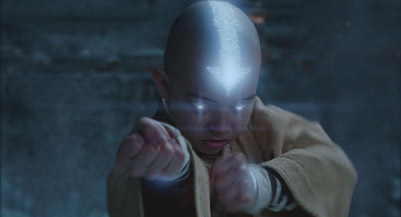|
|
Movie Review: The Last AirbenderBy Matthew HuntleyJuly 8, 2010
The movie is based on the well-received Nickelodeon TV series called Avatar: The Last Airbender, and the feature version was supposed to share the same title until a little-known movie called Avatar came long and stole the limelight. Like the show, the movie takes place in a world (it’s never established if it’s Earth, but we assume it is) where certain members of the Four Nations - Air, Water, Earth and Fire - are able to manipulate their respective element. A lone Avatar is destined to maintain peace and harmony between each nation because he is the only one with the ability to bend all four elements. He is their savior. In this first installment, subtitled Book One: Water, we learn the Avatar is a little boy named Aang (Noah Ringer), who has been frozen in suspended animation for the last 100 years. Born an Airbender and aware of his own destiny, Aang fled his monastery because he feared the responsibility bestowed upon him. He cries that his prestigious position would prevent him from having a family of his own. Here’s my first question: Aang is approximately 10-12-years-old, right? Would a 10-12-year-old really be concerned about not having a family later in life? Do they even think about that kind of stuff? Anyway, in the time since Aang disappeared, the greedy Fire Lord Ozai (Cliff Curtis) wreaks havoc on the other nations as a means to dominate the world. Okay, second question: how is he able to do this, especially when the other nation-members could simply manipulate their own element and fight back? For instance, on the Earth nation, the Earth people are enslaved by the Fire people. Why don’t the Earthbenders just raise some soil and knock them off the land? Why do they just stand around and take it?
|

|
|
|

|
Friday, April 19, 2024
© 2024 Box Office Prophets, a division of One Of Us, Inc.


